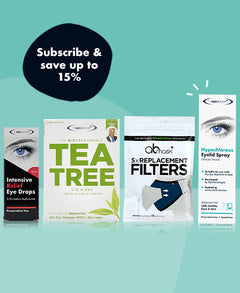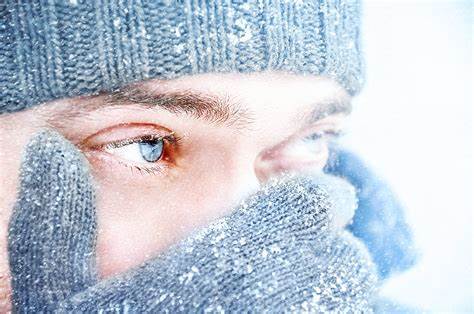Preventing Dry Eyes in winter
Harsh, brisk winds and crisp outdoor conditions are something we’re all familiar with during the winter months.
All of which can have a significant impact on our eyes as the combination of cold, dry air paired with indoor central heating can exacerbate dry, sore, gritty eye symptoms.
Here are some ways in which winter weather can affect your eye health:
- Low Humidity: In the winter, the air tends to be drier both outdoors and indoors due to lower humidity levels. Dry air can cause the tears in your eyes to evaporate more quickly, leading to dryness and discomfort.
- Windy Conditions: Despite high winds causing our eyes to water, windy winter weather can increase the evaporation of tears from the surface of your eyes, making your eyes feel dry, gritty, and irritated.
- Indoor Heating: when it’s cold outside, we make it warm inside, but heated indoor environments can be very drying to the eyes. Central heating systems, space heaters, and fireplaces can reduce indoor humidity levels, exacerbating dry eye symptoms.
- Reduced Blinking: In cold weather, people tend to blink less frequently. Blinking is important because it spreads a thin layer of tears (the tear film) over the surface of your eyes to keep them moist. Reduced blinking can lead to increased dryness.
- Eye Irritation: Exposure to cold air and wind can cause your eyes to water as a protective response. Paradoxically, this excess tearing can wash away the thin tear film on your eyes' surface, leading to dryness once the tears evaporate.
- Allergens: Some people may also experience winter allergies, such as indoor allergens like dust mites, pet dander, or mould, which can exacerbate dry eye symptoms.
To help manage dry eyes during the winter months, our experts recommend the following tips:
- Use a Humidifier: Adding a humidifier to your home can increase indoor humidity levels, which can help maintain a more comfortable level of moisture in the air.
- Use Eye Drops: The Eye Doctor Intensive Relief Eye Drops can provide fast-acting moisture relief from dry eye symptoms. These drops can be used as and when required, in general 4 times a day is recommended
- Protect Your Eyes: When going outside in cold or windy conditions, if necessary we recommend sunglasses or protective eyewear to shield your eyes from the elements, be it sunshine or harsh winds
- Warm Compresses: Applying The Eye Doctor Antibacterial Warm Compress to your closed eyelids for a 7-10 minutes twice a day can help open up blocked oil glands and improve tear film quality.
- Consider adding Omega-3 fatty acids to your diet. These may help to reduce dry eye and support normal vision and are often available in a dietary supplement.
- Blink Regularly: Be conscious of blinking more often, especially when using screens or reading, to ensure your eyes stay moist.
- Avoid Eye Irritants: Try to minimise exposure to indoor irritants, like smoke or allergens, that can worsen dry eye symptoms.
- Consult an Eye Specialist: If your dry eye symptoms persist or worsen during the winter months, consider seeing an eye specialist or Ophthalmologist. They can assess your condition and recommend specific treatments or medications.
Remember that dry eye management can vary from person to person, so it's important to find a routine that works best for you in order to keep your eyes comfortable during the winter season. Our essential eye care routine bundles have been created to suit your eyes’ needs, from moderate dry eyes to severe persistent dry eyes. There’s something for everyone and are guaranteed to help keep your eyes comfortable, hydrated and clean all year round.






